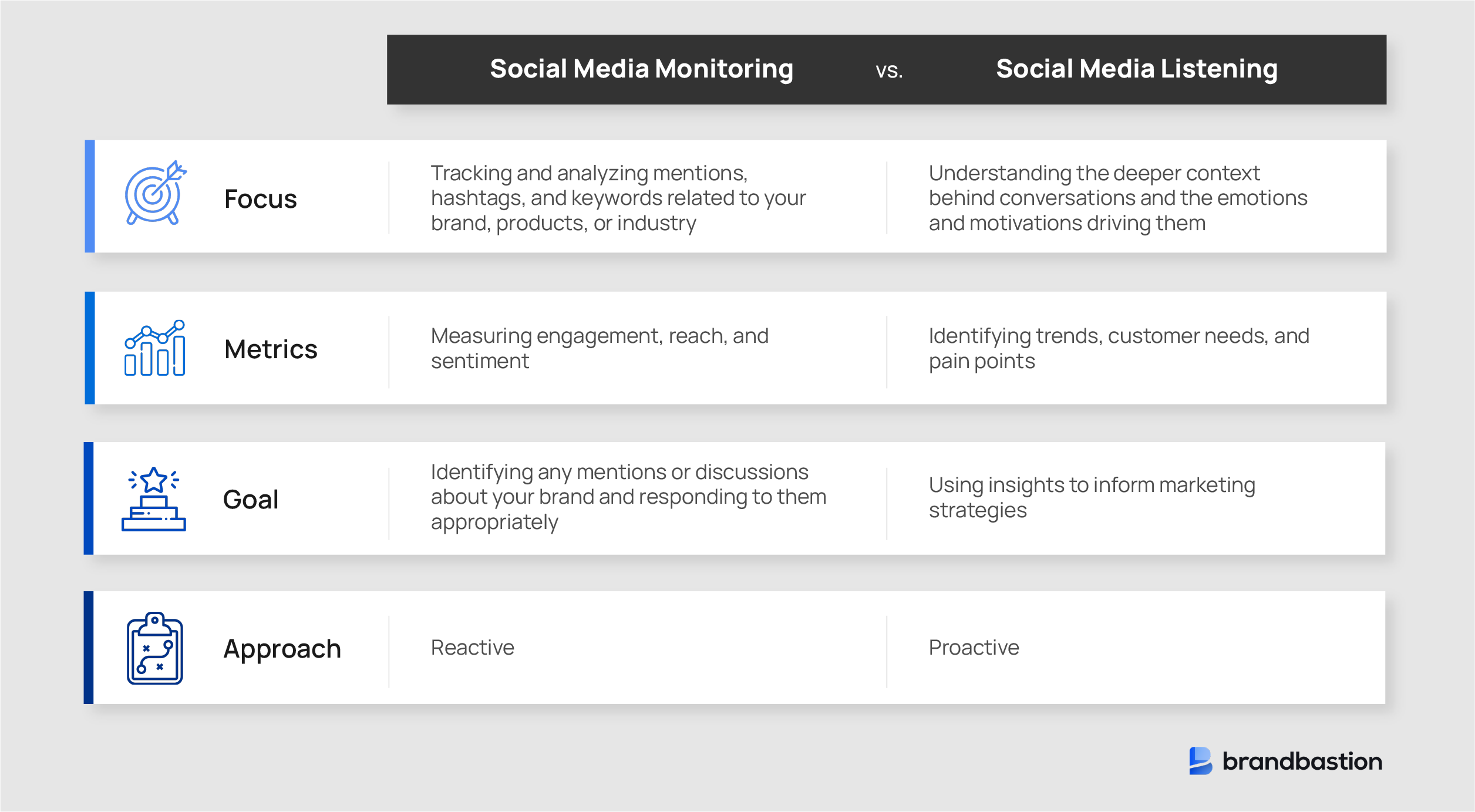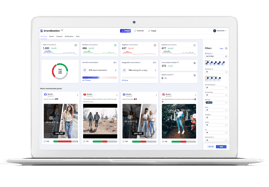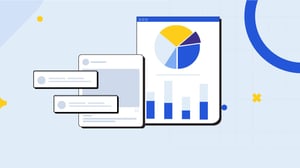
Social Media Monitoring – What is it?
A good social media monitoring strategy is a great asset for any company – regardless of size or industry. However, to monitor social media successfully, one needs to know what it is and how to make the most out of it. Fortunately, that is exactly what we'll cover in this article. You’ll get a brief introduction to the topic and why it is essential for your company.
What is social media monitoring?
The definition of social media monitoring is, simply put, the process of tracking, collecting, and analyzing data and activity on social media platforms. This could, for example, be tracking mentions of a specific brand or analyzing sentiment in comments online. Social media monitoring can also include taking action on insights based on this process.
Let us look into what this means in practice. For example, many companies are active on different social media platforms with ads, offers, and campaigns running simultaneously in various channels. Hopefully, the engagement is high, the positive comments are rolling in, and the audience asks where to buy the products. But, unfortunately, there are also times when nothing really happens, or worse - the comments section fills up with spam and malicious content.
Regardless of the scenario – social media monitoring can help you set up an efficient workflow to handle those types of activities. Typically, companies use some kind of tool for monitoring social media. These tools can often help collect and structure necessary data and information. In addition, many of them offer the possibility to get insights about volumes of conversation and sentiment analysis. Some can even highlight comments that require customer support or filter out spam.
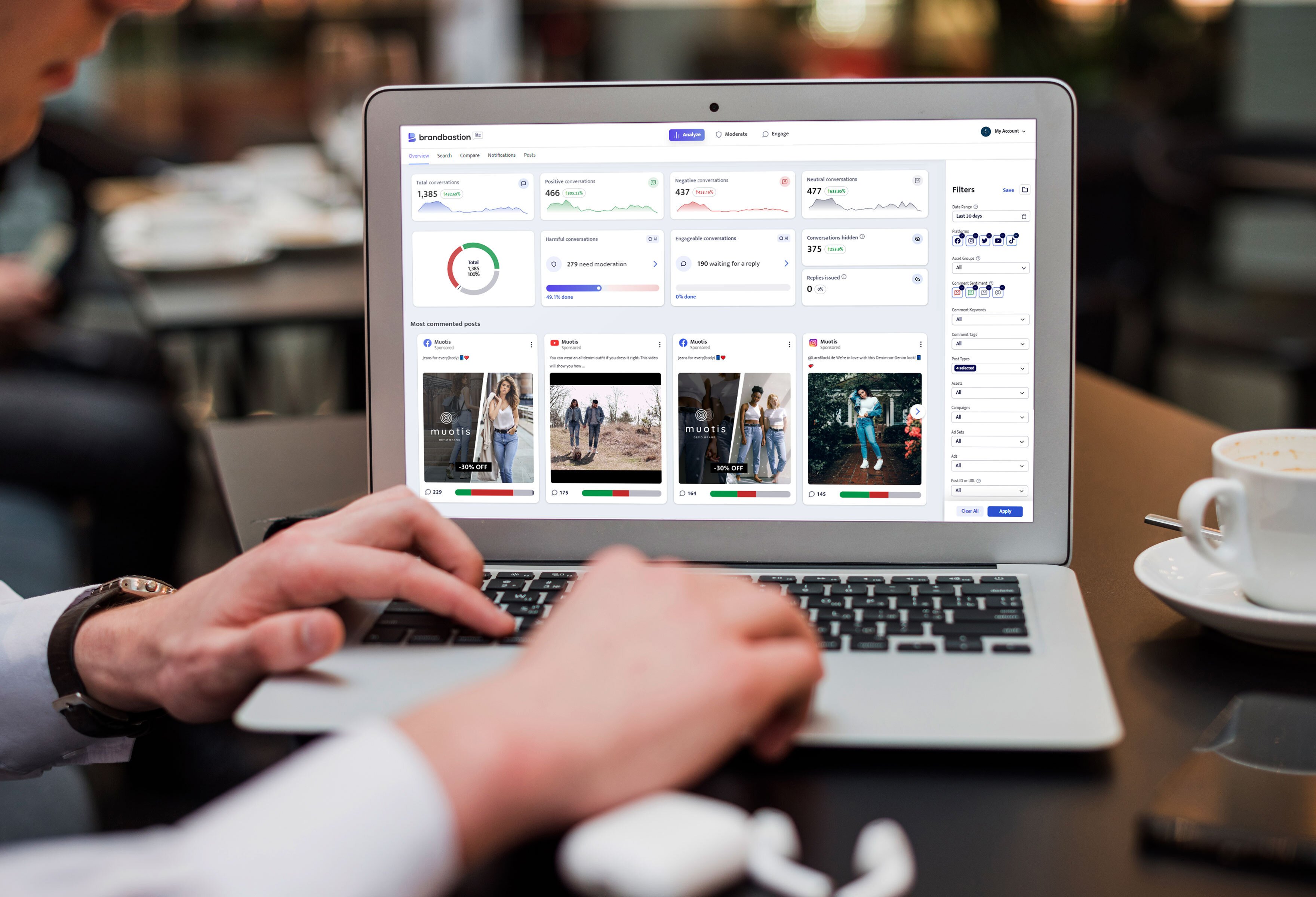
Example of a social media monitoring tool: BrandBastion Lite
Social media monitoring and social media listening – is there a difference?
When talking about monitoring social media, the term social media listening is commonly used in the same discussion. At first glance, the distinction between these terms can be diffuse. However, most Social Media Marketing (SMM) experts say that social media monitoring is fundamentally different from social media listening.
Usually, the two are divided into a micro and macro perspective. Social monitoring is more about managing social media channels on a micro level, including daily tasks like tracking, collecting, analyzing data, and interacting with followers on social media platforms.
Social media listening, on the other hand, is more about macro perspectives and long-term goals. What are people talking about? How are they talking about it? As the name suggests – it is about listening. Insights collected from listening can then function as a guide for setting up long-term strategies.
However, the two areas are closely intertwined and function as a great complement to each other. For example, knowing how to best take action on everyday SMM tasks is hard if you don't know your audience. And it is easier to listen if you have an efficient solution to filter out relevant information.
Differences between Social Media Monitoring and Social Media Listening
What are the benefits of social media monitoring?
As you might already have understood, monitoring social media has many benefits. For instance, it will provide actionable insights to increase conversion rates, grow positive brand sentiment, protect the brand reputation, and optimize the overall marketing strategy.
As mentioned above, many companies use tools to execute their social media monitoring strategies efficiently. There are a lot of different tools, but in general, they can help companies facilitate tasks like:
- Answering questions and comments
- Searching for relevant keywords
- Analyzing sentiment
- Observing trends
- Taking action in urgent situations
- Understanding social ROI (Return on Investment)
- Filtering out spam, scams, and other harmful content
And what are the benefits of efficiently managing tasks like this? Let us look at an example of the benefits of responding to questions and comments efficiently.
Meet customers' expectations by answering questions immediately
According to a survey on expected response time for social media questions or complaints, 18% expect an immediate response to questions or complaints on social media. In addition, 28% expect a response within an hour, and 37% expect an answer during the same day. Read our article on how to respond to public comments on Facebook here.
These numbers could be interesting to consider when looking at questions that indicate product interest or a purchase intention since they can increase the chance of converting potential customers directly to the ad. With the help of a social media monitoring tool, you could automatically filter out comments with keywords and phrases that indicate an interest in buying.
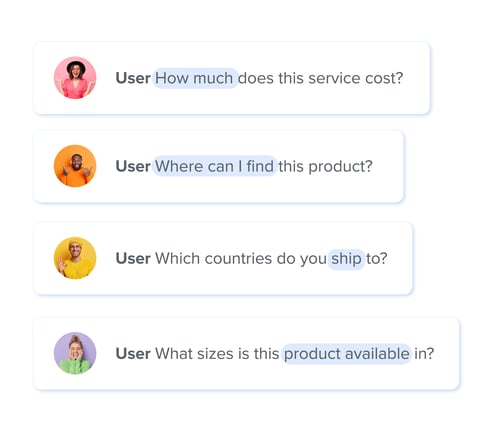
Using keyword filtering to enhance social media monitoring
A quick automated response would not only facilitate the management of your social media. It would also assist many of your customer queries within the expected response time.
Since we are a big fan of numbers and data, BrandBastion ran an A/B test campaign to see how answering these types of questions could impact conversions. The campaign where we answered consumer queries on behalf of an e-Commerce brand resulted in +24% more conversions and +47% more purchases.
An example of a successful implementation of social media monitoring
With a better overall understanding of the benefits of social media monitoring, we can look deeper into a real-life example of what impact successful social media monitoring could have.
Purdue University – increased positive sentiment and engagement
Over the last few years, higher education institutions have realized that social media is not only a place for advertisement. It is also a key channel for understanding their audience, driving enrollment, and fostering a sense of community.
One institution which has actively worked to utilize these insights is Purdue University – a public institution founded in 1869 in Indiana, United States. Purdue University has been the largest and second-largest in undergraduate engineering enrollment for more than a quarter-century and currently has over 1,000,000 followers across different social media platforms.
On a daily basis, Purdue University shares engaging and informative content about life on campus. Their focus is to maintain an inclusive community that values every person's inherent worth and value. In addition, they want to create a civil and fruitful space for discussions.
By partnering up with BrandBastion and implementing social media monitoring, Purdue University can take the pulse on campus conversations, understand the brand sentiment, and assess content resonance to optimize its strategy – all in real-time.
.png?width=565&height=512&name=purdue-university-brandbastion-intelligence%20(1).png)
Purdue University's social media monitoring dashboard
Fostering a positive and engaged student community helped the university increase brand awareness and ultimately drive enrollment. As an overall result, the positive sentiment increased by 42% – after only three months.

Results achieved with BrandBastion Safety, Care, and Intelligence
Read more about Purdue University's implementation of social media monitoring here.
Social media monitoring is essential for a healthy online presence
In conclusion – social media monitoring is essential for any company with a social media presence, regardless of size or industry. With the proper structure, strategy and tools, social media monitoring can help your brand get more conversions, keep your customers safe and increase positive brand sentiment.
Want to get things started? Start a free trial with BrandBastion Lite right away!
Social media monitoring made easy
Facebook, Instagram, Youtube, TikTokAds & Organic covered (including FB Dynamic Ads)
START FREE TRIAL
